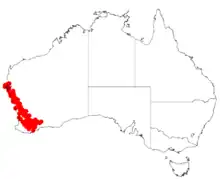| Acacia leptospermoides | |
|---|---|
| Scientific classification | |
| Kingdom: | Plantae |
| Clade: | Tracheophytes |
| Clade: | Angiosperms |
| Clade: | Eudicots |
| Clade: | Rosids |
| Order: | Fabales |
| Family: | Fabaceae |
| Subfamily: | Caesalpinioideae |
| Clade: | Mimosoid clade |
| Genus: | Acacia |
| Species: | A. leptospermoides |
| Binomial name | |
| Acacia leptospermoides | |
 | |
| Occurrence data from AVH | |
Acacia leptospermoides is a shrub belonging to the genus Acacia and the subgenus Phyllodineae and is endemic to a large area of south western Australia.
Description
The fleshy leafed shrub typically grows to a height of 0.1 to 2.0 metres (0.3 to 6.6 ft)[1] and has glabrous or hairy branchlets with connate caducous stipules that are about 2 mm (0.079 in) in length. Like most species of Acacia it has phyllodes rather than true leaves. The grey-green and fleshy phyllodes have a linear to obovate or orbicular shape and are planoconvex or horizontally flattened. The phyllodes are usually 3 to 17 mm (0.12 to 0.67 in) in length and 1 to 7 mm (0.039 to 0.276 in) with three faint nerves beneath and one nerve above.[2] It produces yellow flowers from June to September.[1] The simple inflorescences are found singly or in pairs in the axils with showy spherical flowerheads with a diameter of 4 to 5 mm (0.16 to 0.20 in) containing 20 to 35 golden coloured flowers. Following flowering thinly coriaceous-crustaceous and glabrous seed pods form. The pods have a linear shape and are constricted a little between each of the seeds and are arcuate to openly once-coiled with a length of up to 3 cm (1.2 in) and a width of 1.5 to 2 mm (0.059 to 0.079 in) and longitudinally arranged seeds inside. The shiny mottled or brown seeds have an oblong to elliptic shape with a length of 2.5 to 3 mm (0.098 to 0.118 in) and an oblique aril.[2]
Taxonomy
The species was first formally described by the botanist George Bentham in 1855 as part of the work Plantae Muellerianae: Mimoseae as published in the journal Linnaea: ein Journal für die Botanik in ihrem ganzen Umfange, oder Beiträge zur Pflanzenkunde. It was reclassified as Racosperma leptospermoides in 2003 by Leslie Pedley then transferred back to genus Acacia in 2006.[3]
There are three subspecies
- Acacia leptospermoides subsp. leptospermoides
- Acacia leptospermoides subsp. obovata
- Acacia leptospermoides subsp. psammophila[2]
Distribution
It is native to an area in the Great Southern, Wheatbelt and Mid West regions of Western Australia where it is commonly situated on sand ridges and sand plains growing in gravelly sandy, loamy or clay soils often around laterite.[1] The species is found from around Shark Bay in the north west to around Cranbrook and Wagin in the south east.[2]
See also
References
- 1 2 3 "Acacia leptospermoides". FloraBase. Western Australian Government Department of Biodiversity, Conservation and Attractions.
- 1 2 3 4 "Acacia leptospermoides". World Wide Wattle. CSIRO Publishing. Retrieved 5 July 2020.
- ↑ "Acacia leptospermoides Benth". Atlas of Living Australia. Global Biodiversity Information Facility. Retrieved 5 July 2020.